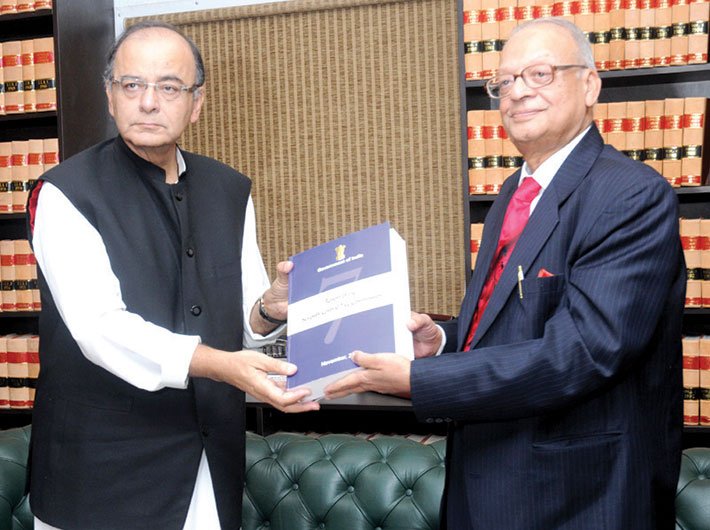An extra Rs 1.02 trillion in the hands of government employees and pensioners can cheer the economy, but the below-expectation pay hike fails to cheer them
As the NDA government, aims for a double-digit growth trajectory of the Indian economy, a pay hike to almost one crore government employees and pensioners can come handy, as it will push demand. The 7th central pay commission (CPC), submitted its report earlier this year, and finance minister Arun Jaitley welcomed it, terming it ‘historic’. The cabinet accepted the recommendations last month. However, employees are not happy, and have announced plans for a protest strike.
The recommendations by the justice Ashok Kumar Mathur commission for providing a hike of an average 16 percent increase in pay, 63 percent in allowances and 24 percent increase in pension have failed to create excitement.
Officers at higher levels getting better increments are worried about the rising inflation. Moreover, they feel their salaries are not at par with those in the private sector. Meanwhile, the low-rung employees and middle-level officers are unhappy with the wages.
Therefore, soon after the release of the pay commission report, employee unions threatened to go on a nation-wide strike on July 11. Questions have been raised on the calculation of the minimum wage, which as per the latest CPC is Rs 18,000 per month as compared to Rs 7,000 earlier. Almost 33 lakh employees have demanded the minimum wage be increased to Rs 26,000. Undoubtedly, the hike is the lowest in the seven decades.
The strike, though, has been deferred for four months after home minister Rajnath Singh assured them of constituting a high-level committee to look into the demands. A sense of resentment, however, looms over the central government employees, especially among the lower rung.
Jaitley though maintains that the government employees’ salary is higher than the private sector after implementation of the 7th CPC.
“We have semi-skilled workers while private sectors have unskilled labour. Trying to establish the co-relation between the two is not required,” says KKN Kutty, president, Confederation of Central Government Employees and Workers.
“A grade four employee working in a government job hasn’t received enough raise. To their current salary a mere amount of Rs 2,500-3,000 will be added,” says Kutty, who works in the income tax department.
“The calculation of the wages is determined on the basis of the price of 14 commodities, primarily including food items like grains and pulses. In the 7th CPC the price of those commodities has been taken lower than the actual market price.
“The raise is not as it should be,” says Kutty, citing it as a reason for resentment.
A pay commission comes after every 10 years. During their representations before the 7th CPC, Kutty and other central government employees suggested merging dearness allowance (DA) with basic pay, which could give financial benefits to employees. “This was, however, not considered. When we raised the issue, it was said that the commission had already commenced with the work,” he says.
The report prepared on the basis of a study by the Indian Institute of Management-Ahmedabad, calculated the wages by comparing them with the same in the private sector.
“Priority has been given to the corporates in defining our pay scale. It cannot be a prerequisite for our pay scale. The government should have defined our pay scale on the basis of the Aykroyd formula, which reflects the basic average cost of living in the country,” suggests Shiv Gopal Mishra, convener of National Joint Council of Action (NJCA), a platform of several employees unions.
Mishra, who is also the general secretary of All India Railwaymen’s Federation, however, clarifies that 7th CPC is a positive move to boost the economy. “People will start investing in consumer goods like automobiles and electronics, overall pushing the economy,” he says.
Apparently, the CPC is consumer-sentiment driven. It leads to increase in consumption and savings. “When people get more money, it comes back in the system in the form of taxation. Savings will increase… spending will go up,” Arun Jaitley had said while accepting the 7th CPC report.
“There is no sense of excitement among our officers’ group. Though the government has been citing that it will boost economy, we are worried it will raise the inflation rate,” says a senior official in the ministry of agriculture on condition of anonymity.
The CPC is likely to impact the inflation rate. It stood at 5.77 percent in early July as experts warned of a spike in coming months. Still, a good monsoon and improved economy can cushion the inflationary effects.
But civil servants in higher ranks are worried about it.
“The rising consumer demand will not neutralise the inflation rate instead it will stoke the consumer price index. So, until the next pay commission, which will come after 10 years, we will struggle in dealing with the inflation with our current pay package. Inflation eats away minimum wage each year. Therefore, employees at the lower grades will be at the receiving end,” says the senior official.
Vijendra, a grade four employee in the horticulture department of Delhi Development Authority (DDA), says, “I am not happy with the seventh pay commission. Last time we received a hike of almost 50 percent and this year it is somewhere between 14 to 25 percent.”
Meanwhile, the CPC in its report has mentioned that it has attempted to provide wages commensurate with a comfortable living, and it aims to promote efficiency, accountability and responsibility in the work culture.
Vijendra, however, wonders if it possible to create such an environment in the years to come. Clearly, he is hinting that high salary does not guarantee better government services in the coming years.
“The government says they will curb corruption. Is it possible?” Vijendra asks sarcastically. n
archana@governancenow.com
(The article appears in July 16-31, 2016 edition of Governance Now)

